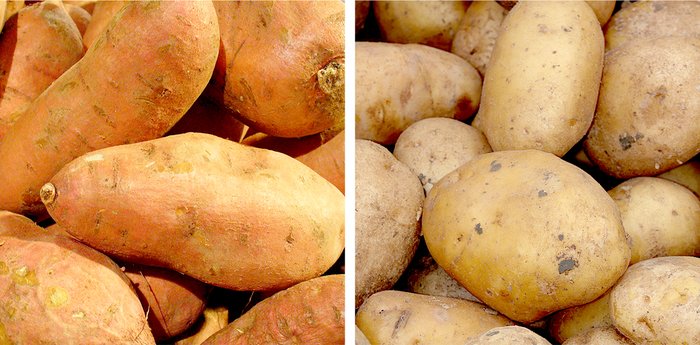It's no secret that many dieters abandon their plans in a few short weeks, and that those who do lose weight successfully often gain a majority of the weight back once they return to their regular eating habits. Alas, both situations can lead to an emotionally and physically damaging cycle, and this cycle is the catalyst for everyone's favorite recurring New Year's resolution to lose weight and keep it off.
In principle, there's absolutely nothing wrong with dieting. However, the goal to be fitter, healthier, or skinnier goes awry when we use an extreme diet to get extreme results in a really short time frame. Instead of making lifestyle changes that are manageable and sustainable, we cram as many get-shredded dieting techniques as possible into 12 weeks and then do what we can to "just get through it."
Then, as soon as the "diet" is over, we fall back to our old habits and return to the bodies we had before. For some reason, we think that if we eat nothing but water soup for a week, we won't gain any weight back when we return to eating grinders and doughnuts.
Unfortunately, nutrition doesn't work that way, but your weight-loss nutrition plan doesn't have to be complicated, and it certainly shouldn't be a constant bummer. Food isn't a problem that you need to "solve." Eating is a natural and necessary part of being human.
So, rather than stress about how much you're going to suffer through your next diet, follow these five simple rules! They'll help you learn how to make sustainable, effective changes to your lifestyle that will last.
1. Don't Eat Like A Pro
If you're not an aspiring bodybuilder prepping for a contest, why are you adopting his meal plan? There are no bylaws that state the only way to get fit is to eat egg whites and oatmeal for breakfast, and chicken, broccoli, and brown rice for lunch and dinner.
While you may find short-term success consuming less than 1,200 calories a day, studies have shown that extreme dieting just plain-old doesn't work in the long run. In fact, there is currently no evidence that a faster rate of weight loss will improve long-term weight loss outcomes compared with more conservative approaches.[1] Lasting success comes from developing maintainable eating habits.

While you may find short-term success consuming less than 1,200 calories a day, studies have shown that extreme dieting just plain-old doesn't work in the long run.
To develop a healthier lifestyle, you may have to let go of the mindset that being ultra-lean is the be-all and end-all of fitness. If you want to see your six-pack, that's perfectly OK, but being able to see it doesn't necessarily make you healthier. In fact, a lot of people have to get to very low body fat percentages for their abs to be visible. If you can't maintain that extreme diet, then you can't expect your abs to hang around.
Instead of gunning for awesome abs, start with less intense goals. If you want lose weight and stay healthy, it can actually help to make goals that have nothing to do with your weight or body fat percentage. Make goals that will help you change your lifestyle, such as cooking and eating meals at home 5 days per week, drinking alcohol only on the weekends, or bringing your lunches to work or school.
Making overall healthier choices you know you can maintain will help you get leaner and stay that way, even if you don't look like a cover model.
2. Count Without Numbers
Weighing your food, counting calories, and determining your macros can be useful if you're not accustomed to being aware of what or how much you're putting into your body. However, it's easy to get confused and overwhelmed with so many numbers.
Remember, the name of the game here is maintenance. Instead of counting calories, which nobody does with perfect accuracy anyway, or stressing about getting one gram of protein per pound of body weight, use general rules like getting 20-30 grams of protein per meal or using your hand to measure portion sizes.[2]

Despite the popularity of programs that give strict recommendations for macros (e.g. high fat, low carb, high protein), current evidence suggests that it's less about composition of the diet and more about total caloric intake.[3,4] Remember, modest caloric reduction (around 500 calories a day from your maintenance intake) plus exercise is your best bet for lasting weight-loss success.[5]
Use tools that are simple for you to adopt into your lifestyle. It's just not necessary to measure an exact number of grams of chicken breast, at least not when you're starting to make overall dietary changes. After all, you're not going to lose or gain 10 pounds by being a gram or two off in either direction.
3. Don't Sweat The Small Stuff
The world is full of information, and even the good information can be misdirected and misused. So, diet advice that suggests salt will make you bloated, egg yolks will make you fat and then kill you, or artificial sweeteners will give you cancer are, uh, a little inflated.
In general, unless you already have high cholesterol or are predisposed to cardiovascular disease, you can eat egg yolks without having to worry about your arteries hardening. Although consuming foods with cholesterol can increase levels of low-density lipoproteins—particles responsible for plaque formation in arteries—eating egg yolks can actually elevate high-density lipoproteins, which are the "good for you" proteins that help remove plaque from arteries.[6]

Additionally, yolks are a great source of vitamins, minerals, and antioxidants. Sure, eating dozens of eggs every day may cause an increase in cholesterol to an unhealthy level, but I'm not sure that study has ever been done.
Your body also needs salt to function properly, so cutting it out entirely is a terrible idea. Moreover, there's very little evidence to suggest that restricting sodium intake has any significant benefits. In fact, a study out of the "Journal of Hypertension" that examined the relationship between blood pressure and salt intake found that 84 percent of the volunteers were not salt-dependent, suggesting that if a relationship between blood pressure and sodium intake does exist, it does not hold true for the entire population.[7]
Furthermore, there are presently no intervention studies on the effects of salt reduction on mortality in the general population, so the universal restriction of sodium intake cannot be scientifically justified. So, yes, you can use actual salt to make your food taste better. You don't have to buy salt-free everything.
Finally, if you're supplementing with protein powder, pre-workouts, BCAAs, or anything with a flavor, you're already ingesting artificial sweeteners. I know there's a lot of talk about how artificial sweeteners make people fat because they make you crave sweets and hanker for snacks. Does that pre-workout make you crave sweets? Does it make you want to snack? Probably not.
Regardless of what you hear, little is understood about the effect of increased consumption of low-calorie sweeteners and dietary patterns. And while most studies have used a rat model, a recent paper from the "American Journal of Clinical Nutrition" found that participants who consumed diet beverages for six months consumed fewer calorie-filled beverages and desserts compared to the water-only group.[8]
What's more, the diet beverage group also reduced their intake of carbs, fat, protein, and sugar. If you want to have a diet soda, have one.
4. Eat What You Like
If your diet is full of food you don't like, how likely is it that you'll stick to it? Why are you eating broccoli or cauliflower if you hate it? There are plenty of vegetables in the world that have excellent vitamin and mineral content like asparagus, romaine lettuce, chard, beets, bell peppers, Brussels sprouts, and so many more! You're not doomed to eat only steamed broccoli for the rest of your life.

If you don't like sweet potatoes, for example, you don't need to stress about eating them. Eat regular potatoes; the differences between the two are negligible anyway.
A 2005 study published in "Eating Behaviors" found that individuals who took a rigid, all-or-nothing approach to dieting were more likely to have a higher body mass index (BMI) and compulsive eating scores compared to the flexible dieting group.9 By giving yourself options when it comes to meal planning, you can create a more positive attitude toward yourself and eating.
If you don't like sweet potatoes, for example, you don't need to stress about eating them. Eat regular potatoes; the differences between the two are negligible anyway. As long as you're making healthier choices like stopping for sushi instead of hamburgers, you'll have more long-term success.
5. Think Long Term
If you keep these things in mind when going through your fitness journey or resolution, you'll be much more likely to have long-term success. No, you won't see your fat melt off in four weeks. And, no, you won't suddenly be able to do a Calvin Klein underwear ad (they'd Photoshop you, anyway), but you know what? You'll make steady progress. That steady progress is the only thing that should matter.
Yes, we're always told that all good goals should have a time frame, but when it comes to weight loss that time frame needs to be extended. Because, clearly, short ones don't always work.

Choose a lifestyle that makes you happy and makes you feel good. If that includes a glass of wine at the end of the day, then so be it.
Nutrition doesn't have to be a difficult science, especially if you are just trying to become a healthier person and have no intention of trying to become a fitness model. Choose a lifestyle that makes you happy and makes you feel good. If that includes a glass of wine at the end of the day, then so be it. The things you love most don't have to disappear forever.
References
- American College of Sports Medicine. (2001). Appropriate intervention strategies for weight loss and prevention of weight regain for adults. Med Sci Sports Exerc, 33, 2145-2156.
- Moore, D. R., Robinson, M. J., Fry, J. L., Tang, J. E., Glover, E. I., Wilkinson, S. B., ... & Phillips, S. M. (2009). Ingested protein dose response of muscle and albumin protein synthesis after resistance exercise in young men. The American Journal of Clinical Nutrition, 89(1), 161-168.
- Astrup, A., Ryan, L., Grunwald, G. K., Storgaard, M., Saris, W., Melanson, E., & Hill, J. O. (2000). The role of dietary fat in body fatness: evidence from a preliminary meta-analysis of ad libitum low-fat dietary intervention studies. British Journal of Nutrition, 83(S1), S25-S32.
- Jeffery, R. W., Hellerstedt, W. L., French, S. A., & Baxter, J. E. (1995). A randomized trial of counseling for fat restriction versus calorie restriction in the treatment of obesity. International Journal of Obesity and Related Metabolic Disorders: Journal of the International Association for the Study of Obesity, 192, 132-137.
- Panel, N. O. E. I. E. (1998). Clinical guidelines on the identification, evaluation, and treatment of overweight and obesity in adults.
- Fernandez, M. L. (2006). Dietary cholesterol provided by eggs and plasma lipoproteins in healthy populations. Current Opinion in Clinical Nutrition & Metabolic Care, 9(1), 8-12.
- Ducher, M., Fauvel, J. P., Maurin, M., Laville, M., Maire, P., Paultre, C. Z., & Cerutti, C. (2003). Sodium intake and blood pressure in healthy individuals. Journal of Hypertension, 21(2), 289-294.
- Piernas, C., Tate, D. F., Wang, X., & Popkin, B. M. (2013). Does diet-beverage intake affect dietary consumption patterns? Results from the Choose Healthy Options Consciously Everyday (CHOICE) randomized clinical trial. The American Journal of Clinical Nutrition, 97(3), 604-611.
- Timko, C. A., & Perone, J. (2005). Rigid and flexible control of eating behavior in a college population. Eating Behaviors, 6(2), 119-125.

